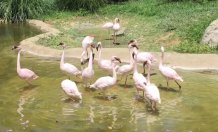articles

The Oakland Zoo's flamingos are now moving about much more
Flamingos tickled pink by revamped exhibit
Flamingos at the Oakland Zoo are at their flamboyant best thanks to scientists at the University of Exeter.
Keepers at the Oakland Zoo in California wanted to know more about the activity of their flamingos because they seemed quiet and didn’t appear to be venturing into their pool very often.
The zoo called in Exeter flamingo expert Dr Paul Rose, who – along with psychology student Luke Jones – analysed the flamingos’ behaviour and suggested changes to their enclosure.
Now the birds are strutting and swimming – and one has even built a nest, despite the lack of females currently in the flock.
“We worked out a way for the zoo to collect data, using the keepers and volunteers who regularly took photos of the birds,” Dr Rose said.
“Luke analysed the data in 2016, and his thesis showed that the flock were not really using all of the space available to them and were quite sedentary.
“They also had a weak social network – their natural behaviour is to favour spending time with certain members of their flock.
“A diagram of a natural social network shows strong connections between certain individuals – those that spend lots of time together.
“The diagram for these birds was a series of dots with no strong links between them.
“Based on these results, we worked with the zoo and showed them changes they could make that would encourage these flamingos to behave more like flamingos.”
Changes were made gradually. They included flooding ground beside the flamingos’ pool to make puddles, and creating shallow areas at the pool’s edge for easy access.
“The birds are now moving about much more, doing a lot more foraging, wading and swimming, and one has even built a nest in the shallow part of the pool,” Dr Rose said.
“They have gone the classic flamingo pose of standing on one leg to using lots more of their space, which is an excellent measure of good zoo animal welfare.
“As well as behaving more naturally, the flamingos have become much more interesting for people visiting the zoo.
“This project is a great example of how science carried out by an undergraduate student can have a real impact. We were able to collaborate with a zoo in the USA and get a great research experience for the student, and a positive outcome for the zoo and its animals.”
The student researcher, Luke Jones, added: “It’s very rewarding to hear that my study of the social network of flamingos has had a positive impact at Oakland Zoo. Hopefully this will act as a good example for other zoos keeping captive flocks.”
Darren Minier, Assistant Director of animal care, conservation and research at the Oakland Zoo, said: “The Conservation Society of California at Oakland Zoo is continually interested in applying research findings to enhance the welfare of animals in our care.
“Though we knew our flock of flamingos would be an outlier for Dr Rose’s research, being a smaller flock of all males, we hoped the information he gathered would aid in our management of the flock through identifying gaps in their social and environmental needs.
“His research, both that conducted at the zoo and with other captive flocks in the UK and Europe, has allowed us to make informed changes to the exhibit habitat including increasing the size and shape of mud flats, lowering water in their pool to engage in behaviours not seen in this flock, and other features leading to behavioural diversity and exhibit use.
“As a result, the flamingos swim and wade more than before, spend time in parts of the habitat which were not previously used, and have even began to build nests for the first time.
“Our next phases will include the addition of females and enclosing the habitat to allow them flight and overnight access, as well as the potential to interact with other bird species.”
Date: 2 October 2019